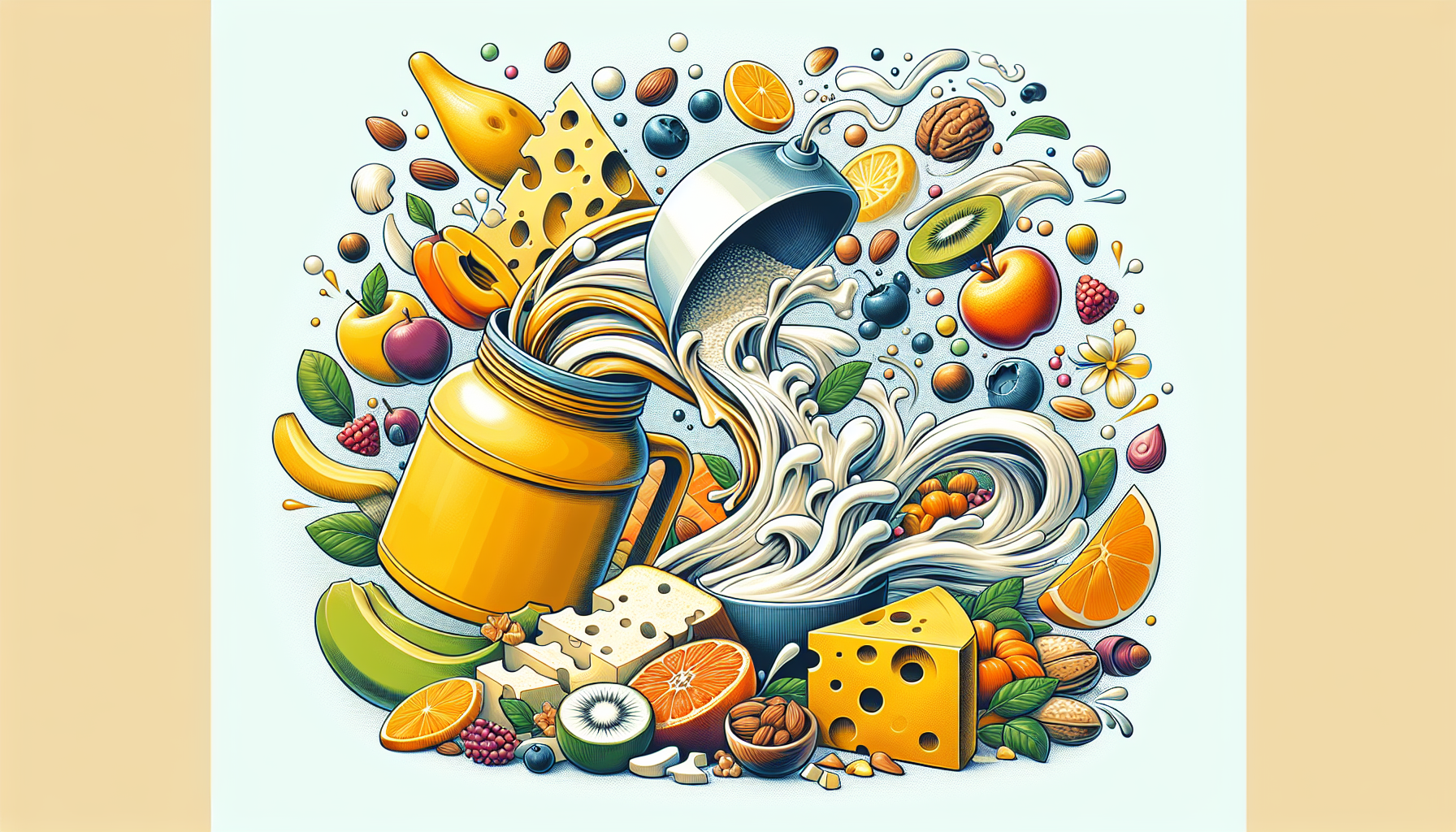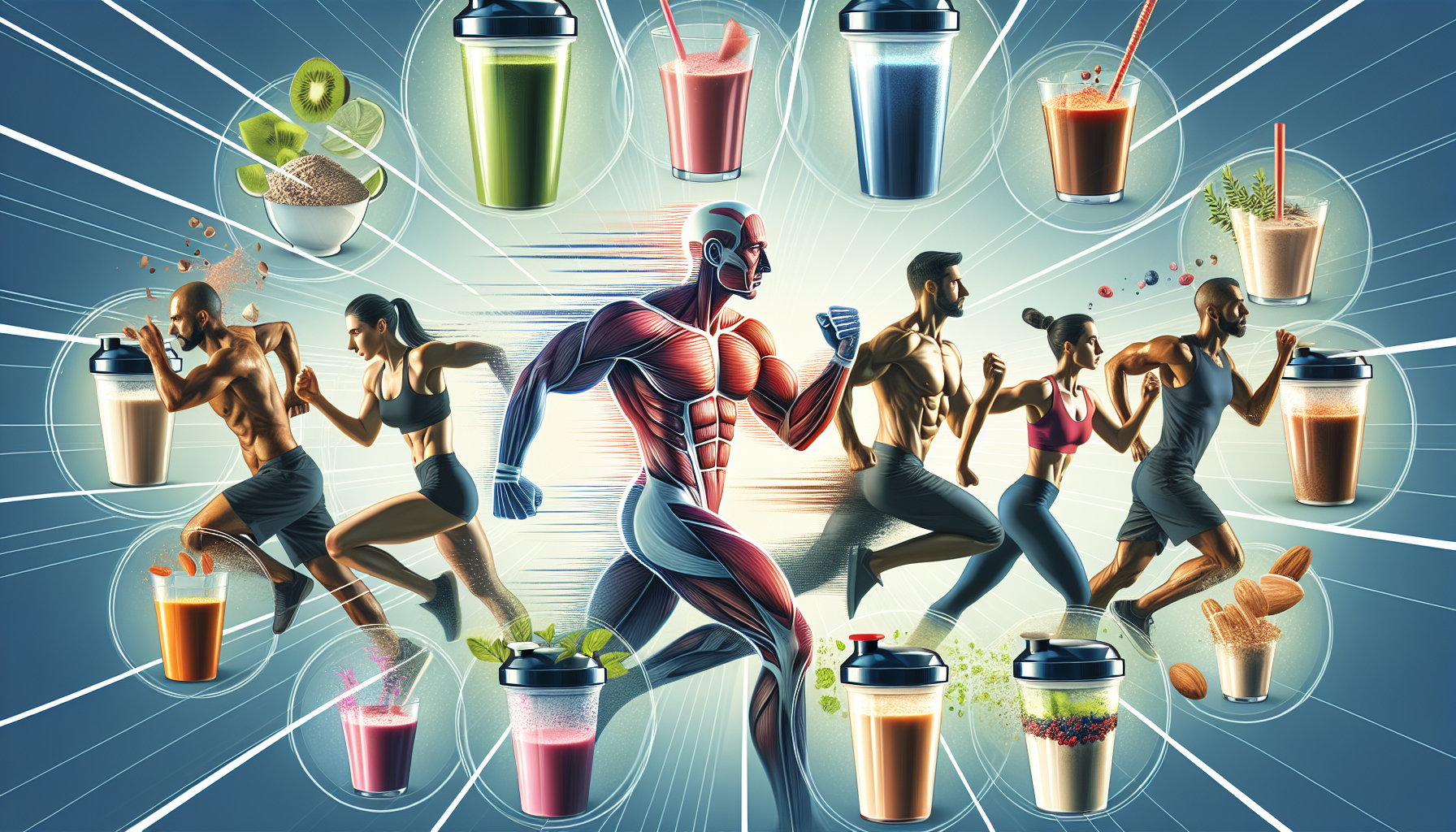Maximise muscle gain and accelerate recovery with the right protein shake. This guide cuts through the noise to help you select the perfect shake tailored to your fitness goals. Discover the best picks for muscle growth, dietary compatibility, and lifestyle needs, along with savvy tips for incorporating protein shakes into your diet for peak performance. Start fuelling your success today.
Key Takeaways
- Protein shakes are beneficial for muscle growth and recovery, with various types such as whey and casein for different needs, and vegan options like pea and soy protein for those with dietary restrictions.
- Customisation and timing of protein intake are important factors to consider for achieving specific fitness goals, with protein powders offering cost-effective and flexible options over pre-bottled shakes.
- While protein shakes are a convenient supplement, they should be balanced with carbohydrates and fats as part of a varied diet, and not overused to avoid nutrient deficits.
Understanding Protein Shakes: Types and Ingredients

When you think of protein shakes, what comes to mind? A quick post-workout drink? A meal replacement when you’re short on time? You’re not wrong. But protein shakes offer more than just convenience. They’re made from various protein sources, each with its unique properties and benefits. From whey and casein to soy and pea, protein shakes cater to various dietary needs and fitness goals.
Let’s proceed to explore the fascinating realm of protein shakes.
Whey Protein
Derived from cow’s milk, whey protein is high in quality and easily digestible. It’s a complete protein, meaning it contains all the essential amino acids your body needs but can’t produce on its own. Whether you’re trying to build muscle or enhance recovery, whey protein is a fantastic choice.
Whey protein comes in three primary forms:
- Concentrate: Contains about 78 to 88 percent protein.
- Isolate: About 98 percent protein, making it a more protein-dense option.
- Hydrolysate: Pre-digested for faster absorption in the body.
Casein Protein
Casein protein is another milk-derived protein, but unlike whey, it digests slowly. This slow release of amino acids makes it an excellent choice for consumption before periods of fasting, such as sleep. It helps aid muscle recovery and prevents muscle breakdown.
The slow digestion rate of casein ensures a steady supply of amino acids to the muscles over a prolonged period, which can help to keep the body in a positive protein balance, crucial for muscle repair and growth. This makes casein a popular choice for a nighttime protein, providing sustained nourishment while you sleep.
Vegan Protein Options
What about those who follow a plant-based diet? Don’t worry, there’s a protein shake for you too. Pea protein isolate, for example, is a vegan-friendly option. It contains a higher protein content than regular pea protein powder but may need to be combined with other proteins to offer a full spectrum of amino acids. Soy protein, another plant-based option, supports immune function, digestive health, and brain function. Pea protein is highly digestible and often combined with other plant proteins for a complete amino profile, while hemp protein is rich in fibre and omega-3s but lower in protein content. Regardless of your dietary preferences, there’s a protein shake out there for you.How to Choose the Right Protein Shake for Your Goals

Choosing the right protein shake for your goals is a critical step in your fitness journey. Whether you’re looking to
- build lean muscle
- gain weight
- support an active lifestyle
- follow a plant-based diet
There’s a protein shake that aligns with your needs. How can we steer through the diverse protein terrain? Let’s find out.
Lean Muscle Mass Building
Building lean muscle mass requires more than just lifting weights in the gym. It also involves proper nutrition, particularly high protein intake. For effective lean muscle mass building, opt for protein shakes that are high in protein, low in carbohydrates, and contain minimal fat. Specifically, whey protein is a great choice for muscle repair and growth. It also aids in weight management by helping to reduce appetite and preserve muscle during weight loss. So, if you’re looking to build lean muscle while keeping your weight in check, whey protein might be the way to go.Weight Gain and Body Composition Improvement
On the other end of the spectrum, some individuals are looking to gain weight or improve their body composition. In this case, protein shakes high in protein, carbohydrates, and calories can be beneficial. Mass-gainer supplements, for instance, are packed with the macronutrients needed for weight gain. And if you’re concerned about quality, keep an eye out for protein shakes certified by third parties, which can provide quality assurance.Supporting an Active Lifestyle or Exercise Routine
Leading an active lifestyle or maintaining a regular exercise routine can be demanding on the body. Protein shakes can support muscle recovery post-exercise, helping you bounce back quicker and stronger. Beyond recovery, protein shakes can also provide sustained energy during workouts. Combining protein with carbohydrates is particularly beneficial for endurance athletes, enhancing performance and aiding recovery. So, whether you’re hitting the gym, cycling, or running a marathon, consider fuelling up with a protein-carb combo.Bottled Protein Shakes vs. Protein Powders: Pros and Cons
Now that we’ve covered the types of protein shakes and how to choose the right one for your goals, let’s delve into the format. Should you opt for ready-to-drink bottled protein shakes or protein powders that you mix yourself? We should consider the advantages and disadvantages of each option.Convenience and Portability
When it comes to convenience and portability, bottled protein shakes take the trophy. They’re ready-to-go, perfect for when you’re rushing off to work or the gym. No need to measure out powder or clean up afterwards. Besides being convenient, bottled protein shakes are also portable. You can easily slip one into your gym bag, backpack, or purse for a quick protein boost anytime, anywhere. And with a wide selection of flavours, from mint chocolate to fudge brownie, you’ll never get bored.Customisation and Variety
While bottled protein shakes are convenient and portable, protein powders offer a high degree of customisation. You can control the macronutrient composition to suit your specific dietary requirements and fitness goals. For instance, you can customise your protein shake by: * Mixing in fruits like strawberries or bananas * Adding nutrient-dense ingredients like chia seeds or almond butter * Adjusting the type of milk or water you use The ability to customise your protein shake makes it suitable for various dietary restrictions and fitness objectives.Cost and Shelf Life
We should discuss the aspects of cost and shelf life. While ready-to-drink protein shakes are convenient, they tend to cost more per serving compared to protein powders. On the other hand, protein powders generally cost less per serving and offer potential savings when bought in bulk. However, if you opt for personalised protein powders to cater to unique dietary restrictions and preferences, the cost may increase compared to standard options.Enhancing Your Protein Shake Experience: Flavours and Add-Ins

After choosing the right protein shake for your goals and deciding between bottled protein shakes and protein powders, let’s make your protein shake experience more enjoyable. We’ll discover ways to experiment with flavours and additional ingredients for a tastier and healthier shake.
Flavour Combinations
Shaking up your protein shake routine can be as simple as trying new flavour combinations. Whether you’re a fan of classic chocolate, white chocolate, or adventurous with flavours like mint chocolate or fudge brownie, there’s a protein shake out there to suit your taste buds.
For instance, a Vanilla Coffee Shake can be created by blending vanilla almond milk with cold-brewed black coffee and vanilla protein powder. For a chocolaty, minty twist, try a Thin Mint Shake made by combining almond milk, chocolate protein powder, unsweetened cocoa powder, and peppermint extract. Or, for a fruity burst, you can’t go wrong with a Bright Berry Shake, composed of vanilla protein powder, water or almond milk, and a mix of berries.
Nutritious Add-Ins
Besides flavours, you can also boost the nutritional value of your protein shakes by adding nutritious ingredients. Some options include:- Chia seeds: offer fibre, Omega-3, and antioxidants, making them a nutrient-rich addition to shakes
- Whole grain oats: provide soluble fibre that helps reduce cholesterol levels and prolongs satiety
- Cacao: enhances your mood and provides anti-inflammatory benefits
Or how about adding almond butter for healthy fats and vitamin E, or acai berries for their high antioxidant content? The possibilities are endless.
Creating a Balanced Meal Replacement
Protein shakes can also serve as a balanced meal replacement. For example, pre-made protein shakes are ready-to-drink and replete with vitamins and minerals, aligning them with the needs of a complete meal replacement.
A balanced protein shake diet involves substituting one or two daily meals with protein shakes, complemented by other nutritious meals and snacks to maintain overall dietary balance. However, remember that protein shakes should be used to supplement, not replace, the protein obtained from a varied and balanced diet.
Tips for Incorporating Protein Shakes into Your Diet
 

Now that you’re equipped with the knowledge to choose the right protein shake, let’s look at some tips for incorporating them into your diet. From determining your protein requirements to timing your protein intake and balancing it with other macronutrients, let’s explore how to make the most out of your protein shakes.
Determining Your Protein Requirements
Protein requirements vary by individual, influenced by factors such as age, sex, weight, and level of physical activity. When considering how much protein to consume, adults should aim for between 10% to 35% of their daily calories from protein, equating to roughly 54 grams for a 150-pound female and 65 grams for a 180-pound male.
However, if you’re focused on fitness and muscle gain, you might need a bit more protein. Aim for 1.6 to 2.2 grams of protein per kilogram of body weight per day to prevent muscle mass loss and promote metabolic function. For instance, if you weigh 70 kilograms (around 154 pounds), you’ll need between 112 and 154 grams of protein each day.
Timing Your Protein Intake
Timing your protein intake can also influence its effectiveness in supporting muscle growth and recovery. Spreading your protein consumption evenly across meals can enhance muscle maintenance and growth.
Moreover, consuming protein supplements within two hours after a workout can aid in the body’s muscle synthesis process. And if you’re consuming casein protein, consider taking it before bed due to its slow digestion rate, which can aid in muscle recovery while you sleep.
Balancing Protein with Carbohydrates and Fats
While protein is essential, it’s important to remember that a well-balanced diet should include not just enough protein but also nutrient-dense carbohydrates and healthful fats. Over-reliance on protein shakes can result in a lack of necessary nutrients, possibly disrupting metabolism.
Consuming too much protein can lead to a nutrient imbalance, potentially causing a deficit in fibre from carbohydrates and healthy fats. It is advised to eat about one-third of daily calories from protein to maintain a balance with other essential macronutrients like carbohydrates and fats.
Summary
In conclusion, protein shakes offer a convenient, customisable, and effective way to meet your protein needs, whether you’re looking to build muscle, gain weight, or support an active lifestyle. From understanding the different types of protein shakes and choosing the right one for your goals, to enhancing your protein shake experience with flavours and add-ins, we hope this guide has given you the knowledge to make the most out of your protein shakes. Remember, protein shakes are just one part of a balanced diet and healthy lifestyle. So, are you ready to shake up your protein routine?
Frequently Asked Questions
Is it OK to drink 1 protein shake everyday?
Yes, it is generally okay to drink a protein shake every day to increase your protein intake, but it's important to consider your overall daily protein consumption and not rely solely on shakes.
What does a protein shake do to you?
Protein shakes can help build muscle, repair tissue, make enzymes and hormones, aid weight loss, and make it easier to increase your protein intake. They are commonly used for muscle gain, weight loss, and injury recovery.
Does whey protein increase sperm count?
While a deficiency in dietary protein can lead to reduced sperm count and quality, excessive consumption of protein does not necessarily increase sperm count. It's important to maintain a balanced intake.
What's the best workout shake?
The best workout shake depends on your specific goals. If you're looking for an energy boost, Slimfast Advanced Energy Meal Replacement Shakes are a good option, while MuscleMeds Carnivour Ready to Drink Protein is great for muscle mass. Ultimately, the best choice will depend on your dietary preferences and fitness objectives.What are the different types of protein shakes?
You can choose from various protein sources for your protein shakes, including whey, casein, soy, egg whites, pea, and hemp, based on your dietary preferences and fitness goals.
